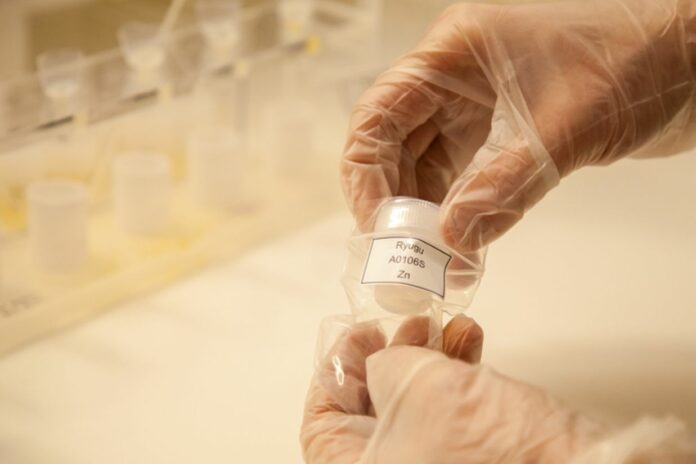Nearly two years after the Japanese mission Hayabusa2 came back to Earth, samples from the asteroid Ryugu are still giving scientists important information about the early history of the solar system.
As part of an international partnership, scientists from the Institut de Physique du Globe de Paris, Université Paris Cité, and CNRS1 have determined the isotopic composition of zinc and copper on the asteroid Ryugu.
The isotopic signatures demonstrate that Ryugu’s make-up is similar to that of carbonaceous chondrites like Ivuna, and that 5–6% of Earth’s mass is made up of material like Ryugu that came from the outer solar system.
The findings are reported today in the journal Nature Astronomy.
Meteorites that land on Earth give scientists a chance to look at pieces of the early solar system. The return of the Hayabusa2 mission in December 2020, operated by JAXA, brings back 5 grams of fragments from the asteroid Ryugu, offering the possibility of analyzing unaltered samples. This marks a major step forward in the study of the asteroid.
The first analyses of the asteroid Ryugu, conducted by a multinational team including scientists from the Institut de physique du globe de Paris, the Université Paris Cité, and the CNRS, have shown that its composition is similar to that of Ivuna-like carbonaceous chondrites (CI) — the most chemically primitive meteorites, which are thought to have a composition closest to that of the Sun.
As of yet, the precise nature of the connection between Ryugu and CI chondrites is unclear since certain isotope signals (such titanium and chromium) overlap with other groups of carbonaceous chondrites.
The accretion processes of volatiles during the creation of telluric planets may be better understood with the help of zinc and copper, two moderately volatile metals.
The CI chondrites are the most concentrated in volatile elements, yet all of the carbonaceous chondrite groups have their own unique zinc and copper isotopic compositions.
By doing more tests on Ryugu’s zinc and copper isotopic composition, scientists were able to use a key tool to figure out where the asteroid came from.
In a study published in the journal Nature Astronomy on December 12, 2022, the international team led by cosmochemists at the IPGP Marine Paquet and Frédéric Moynier demonstrated that the isotopic ratios of copper and zinc in samples from Ryugu were identical to CI chondrites but distinct from all other types of meteorites.
This work confirms that these primitive samples from Ryugu are the best estimate of the solar composition to date for copper and zinc by verifying the similarities between Ryugu and CI chondrites.
Ryugu’s zinc isotopic composition may also be utilized to learn about Earth’s accretion history of moderately volatile elements, which are crucial to the evolution of habitability. The study also shows that material like that of Ryugu makes up about 5% of the mass of the Earth.
Source: 10.1038/s41550-022-01846-1
Image Credit: IPGP
